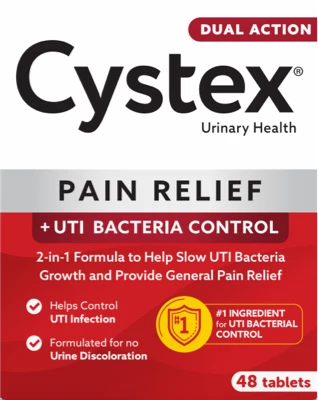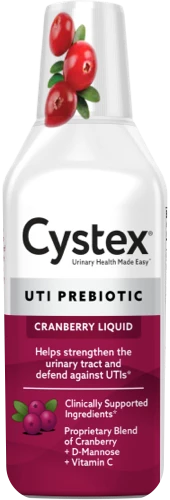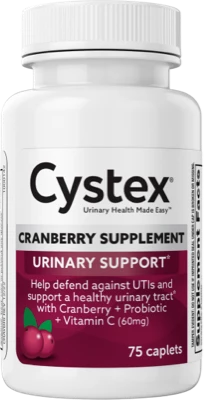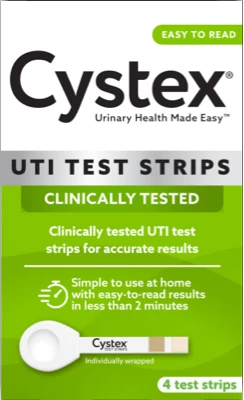S-E-X and U-T-Is: Here’s How to Avoid Feeling the Burn from the Bedroom
A urinary tract infection (UTI) can bring your sex life to a screeching halt and, unfortunately, UTIs and sex often go hand-in-hand. In fact, research shows that nearly 80 percent of pre-menopausal women with urinary tract infections have had sex within the past 24 hours.1
Why is the sex-UTI connection so strong? UTIs are usually not related to sexually transmitted diseases, but physical aspects of sex can increase UTI risks because:
- Ramped-up sexual activity – such as on your honeymoon or in a new relationship – can also ramp-up the chances of bacteria getting pushed into your urinary tract.2
- Sexual activity and certain birth control methods (specifically condoms, diaphragms, or spermicides) can lead to urinary tract irritation, especially at the urethra opening, and irritated tissues are more vulnerable to infection.2
Fortunately, there things you can do to lower your sex-related UTI risks. Try these tips at home, at the hotel, or wherever love finds you.
Get off to a well-hydrated start. Most experts recommend drinking 6-8 glasses of water per day*, depending on the weather and your activities. Drinking plenty of water helps to keep you peeing often and helps to make urine dilute – so potential UTI-causing bacteria have a harder time hanging around.3
Avoid alcohol. Despite what you see in movies, romance doesn’t require wine, champagne, or any other type of alcohol. If you’re prone to urinary tract infections or just want to be in tip-top urinary shape, consider skipping such drinks Alcohol is a potential bladder irritant and can contribute to dehydration.3
Pee before and after sex. A trip to the toilet after sex is especially important so you can flush out any bacteria that may have snuck into your urethra while you were having fun.3 Remember to always wipe from front to back to keep bacteria from your bottom away from your urethra. Use a clean piece of toilet tissue for each pass.4
Freshen up. Gently clean your external genital and anal areas before and after sexual activities. Wash the outside of your genitals with warm water. You may use a little mild soap on your sensitive parts. As you clean yourself, use only front-to-back motions. If you use a wash cloth, use one clean cloth for your vaginal area and one clean cloth for your anal area.3
Aside from gentle external cleansing, let your vagina handle itself. Your vagina has its own natural cleaning system that flushes out bacteria, menstrual blood, and semen. In most cases, you don’t need to add anything extra to help.5
Be yourself. Avoid scented feminine and bath products like douches, powders, sprays, bubbles, salts, and oils. They can irritate your urethra and increase infection risk.3,5 Know that even healthy, “clean” vaginas come with mild odor that changes through the day. If you are concerned about vaginal smells, talk to your doctor.5
Take the action OUT of the tub. Bubble baths may look romantic but they can increase UTI risks. Bath water easily can become contaminated and can give bacteria a chance to get into your urethra.6 Hey, isn’t showering sexy, too?
Change out of damp underwear a.s.a.p. Bacteria, like the ones that cause UTIs, love warm, moist environments.7,8
Consider your birth control. Diaphragms, condoms, and spermicides can lead to irritation in some women, which in turn can increase risks for UTIs. If you’re prone to urinary tract infections, talk to your doctor about what birth control method may be best for you.9
Try Cystex Urinary Health Maintenance to help maintain your urinary health. One tablespoon is full of ingredients that can benefit your urinary system including a prebiotic to help promote healthy bacteria, an anti-inflammatory to help to prevent tissue damage, an anti-adherent to help keep bad bacteria from hanging around, and an anti-oxidant to generally help protect your body.
Loving your love life but hating the fact that, despite following all the tips above, you still ended up with a UTI? Remember, urinary tract infections are very common and your doctor can help you.
As soon as you experience UTI symptoms like a frequent urge to urinate, a burning feeling while urinating, cloudy or strong smelling urine, or pelvic pain; contact your doctor right away. The only cure for a UTI is a prescription antibiotic.
Waiting for your appointment or medicine? Try an over-the-counter medicine for UTI like Cystex Pain Relief & UTI Bacteria Control Tablets to help provide UTI relief and keep the infection in check in the interim.
And, no, the honeymoon isn’t over.
*Talk with your healthcare provider if you can’t drink the recommended amount due to other health problems, such as urinary incontinence, urinary frequency, or kidney failure.
References:
- The Link Between UTIs and Sex. Everyday Health website http://www.everydayhealth.com/urinary-tract-infections/the-link-between-utis-and-sex.aspx. Accessed September 30, 2016.
- Urinary tract infection fact sheet. WomensHealth.gov website. http://www.womenshealth.gov/publications/our-publications/fact-sheet/urinary-tract-infection.html#b. Accessed September 30, 2016.
- Urinary tract infection in women – self care. Medline Plus website https://medlineplus.gov/ency/patientinstructions/000391.htm. Accessed September 30, 2016.
- Your Guide to Urinary Tract Infections. WebMD website http://www.webmd.com/women/guide/your-guide-urinary-tract-infections#1. Accessed September 30, 2016.
- Douching fact sheet. WomensHealth.gov website http://womenshealth.gov/publications/our-publications/fact-sheet/douching.html. Accessed September 30, 2016.
- Prevention of Urinary Tract Infections in Women – Overview. Medscape website http://emedicine.medscape.com/article/1958794-overview. Accessed August 9, 2016.
- Your Guide to Urinary Tract Infections. WebMD website http://www.webmd.com/women/guide/your-guide-urinary-tract-infections#3. Accessed September 30, 2016.
- Prevention of urinary tract infections in women. Medscape website http://emedicine.medscape.com/article/1958794-overview. Accessed September 30, 2016.
- Urinary Tract Infection in Adults. National Institute of Diabetes and Digestive and Kidney Diseases website https://www.niddk.nih.gov/health-information/health-topics/urologic-disease/urinary-tract-infections-in-adults/Pages/facts.aspx. Accessed September 30, 2016.







